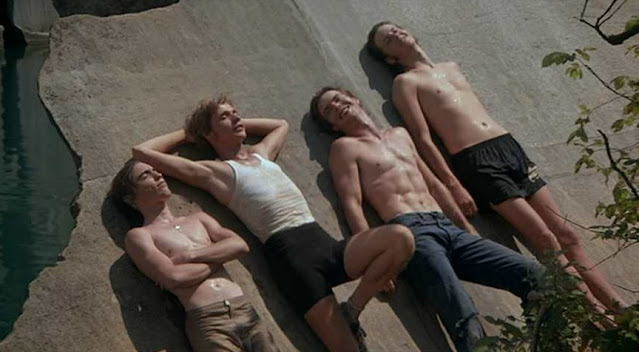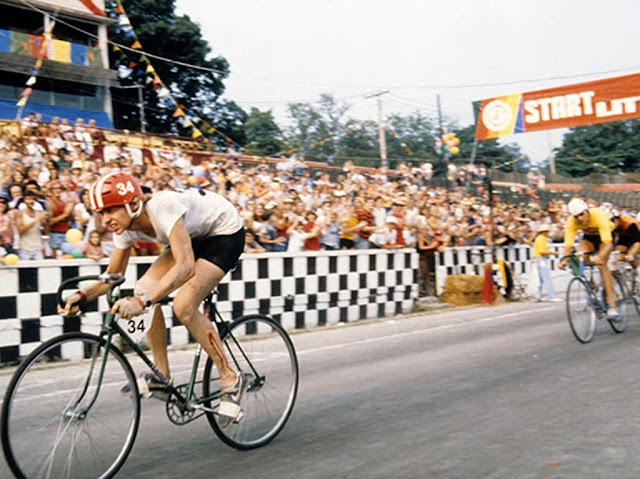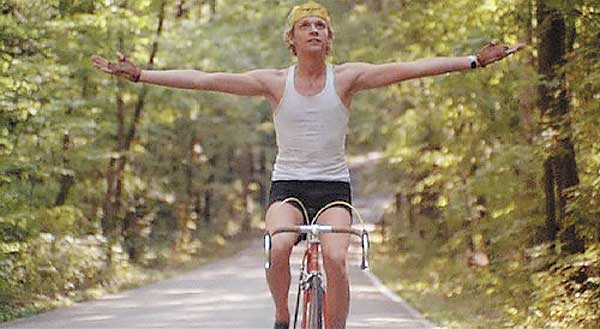In 1962, Phi Kappa Psi fielded a relay bicycle racing team that included legendary rider Dave Blase, a gifted rider who went on to race in the Little 500 for Indiana University, completing 139 of the 200 laps on his own, securing the victory for his team. Blase was an Italian enthusiast and his story would serve as inspiration for the 1979 film Breaking Away. Steve Tesich, writer of the screenplay, was on the Phi Kappa Psi team alongside Blase and used his teammate’s story as inspiration for the film, tapping into his teammate’s quirks and foibles as well as his talent and determination, rounding out the character of Dave Stohler as well as the frustrations of him and his friends who find themselves on the outside of the more socially respected students of Indiana University. The view, looking in from the outside, would also serve as a social commentary on the affluent and the poor and how each interacts with the other.
Dave (Dennis Christopher), Mike (Dennis Quaid), Moocher (Jackie Earle Haley), and Cyril (Daniel Stern) are working-class friends living in the university town of Bloomington, Indiana. Having just graduated they are in that brief window in life where they will make the decisions that will color the rest of their lives. They spend much of their time swimming in a local abandoned water-filled quarry and clashing with the more affluent Indiana University students. Dave is obsessed with competitive bicycle racing, Italian racers specifically since he recently won a Masi bicycle. This recent obsession with all things Italian chafes at his down-to-Earth father (Paul Dooley) who is a former stonecutter who now runs his own used car lot. The mother (Barbara Barrie) further exacerbates the situation by encouraging the behavior and serving Italian meals at dinnertime.
Virtually anyone who has attended high school knows people like the ones that make up the main cast of Breaking Away. David Stoher is the kid who gets obsessed with things, be it Pokémon, Dungeons and Dragons, or in his case, Italian culture. Mike is the high school jock who wants to play college ball but for one reason or another cannot. Consequently he says he didn’t want to in the first place but secretly loathes that he peaked in the twelfth grade. Moocher has a chip on his shoulder simply for his short stature, ready to fight anyone who makes fun of him for it. Lastly Cyril is just a screwup and all around goofy guy. All four of these young men have just graduated high school, have no prospects for college, and are in that void in life where they will soon have to make a choice on which direction their lives will take, whether it is entering the work force or joining the army.
It’s not easy to make a film where we suspect tragedy to raise its evil head at any moment and then drop back down, un-satiated. There are moments scattered throughout where it seems that at any moment a serious accident is about to occur. Several scenes take place at an abandoned quarry now filled with water. The four friends gather there to dive and swim around. Having grown up around a bridge the locals liked to use for jumping into a river below I have seen my share of mishaps and injuries and kept expecting something like that to happen here and Peter Yates films it in such a way to welcome such thoughts. One such moment involves Mike swimming down to a sunken refrigerator and shutting the door on himself. The others think he may have gotten locked inside and go to rescue him only to find out it has no back to it and he was pranking them. The closest we get to a real injury, aside from an injury during the climatic race, is when Mike is trying to beat one of the college kids at a swimming race and hits his head on the edge of the rocks. He pushes on and has to be stopped by the rest of his friends. Later there is a moment when Dave is engaged in a high speed duel with a Semi that seems destined for a serious accident. The only thing that comes out of that is the Semi getting pulled over by the cops. These moments don’t lead to serious injury or death but imbue the characters with a real sense of vulnerability.
The movie is, for the most part, a light comedy but it often veers into the harsh realities these young men are facing in a way that is heartbreaking. While these moments are poignant and peppered thoroughly throughout they never overwhelm the comedic nature of the film. It is a delicate balance that shouldn’t work yet it does. During a brawl between the friends and the college kids Cyril, having managed to get a bowling ball stuck on his fingers, is flailing around in such a way there should be some serious injuries, yet it never plays up just how dangerous this would actually be. The fight is very serious and will play a key role in setting up the finale but it’s also a moment with a great deal of levity mixed in. This movie could have been a disaster to bring to the screen yet Peter Yates proved to be up to the task crafting a film that many people will find immediately identifiable.
We rarely see a film that so perfectly encapsulates middle America the way Breaking Away does. The characters are corny at times, over-the-top and even a little off kilter. Yet they are fully fleshed out in a way that many more serious films have failed to accomplish. When David is standing outside the girl’s dorms serenading Katherine with Italian opera while Cyril accompanies him on guitar it is ridiculous and bizarre, yet it is also sweet and Katherine has a look on her face that says she is charmed by this awkward show of affection. She is romanced by him, thinking he is an Italian exchange student but turns on him when he is disenfranchised by the Italian bicycle racing team and he admits to her that he’s not really Italian but a local and a “Cutter,” i.e. working class.
The climax of the film involves the Little 500, an Indiana University bicycle relay race. The Dean of the University, in order to help restore some camaraderie between the townies and the students, has opened up the race to local riders, too, allowing Dave to compete so long as he can field a team. His friends sign up, knowing they are not trained riders and assuming Dave will do the majority of the work. He does but an accident late in the race leaves him injured and they have to step up to help him complete the run. The ending is of course no surprise but it is still fun to watch it play out. The only real suspense comes when Dave gets his injury and doesn’t think he can continue. He is so much better than the competition but with many, many laps remaining it doesn’t take long to lose that lead without him on the bike.
This is a film about people, not just the four friends, finding themselves in their various places in their lives. Dave struggles with his relationship with his parents, specifically with his father who doesn’t understand his son nor his fascination with Italian culture. They reconcile before the big race after Dave has jettisoned his fake Italian accent and culture fascination. They bond when the father finally opens up to his son about how, when he used to be a quarry worker he helped raise the buildings on the campus only to end up feeling unwanted on site after the work was done. This attitude towards the “Cutters” has painted his opinion on the University and those that attend it. His father begins riding a bicycle around town, too, a further sign that the two are finding something more to bond over. His reaction when Dave begins obsessing over the Tour de France and speaking with a French accent says it all, though.
These kind of movies are sometimes referred to as Slice of Life films, but that is a bit of a misnomer in this case. There is more to it than just a brief glimpse into people’s lives. There are some complex themes on display and a father/son relationship that needs some healing and mutual understanding to take place. There are generational gaps as well as wealth gaps in the town that both sides battle with. The college kids are shown to be mostly jocks and snobs, taking from the “Cutters” even when they already have their own of what it is they are taking. This is depicted by the college kids repeatedly showing up to swim and dive at the quarry when they already have indoor and outdoor pools on campus at their disposal. The final race is more than Dave having to prove to himself that he can do it, it’s also about proving to the more privileged kids that he, too has worth and can hold his own amongst them.
Academy Award Nominations:
Best Picture: Peter Yates
Best Director: Peter Yates
Best Supporting Actress: Barbara Barrie
Best Screenplay - Written Directly for the Screen: Steve Tesich (won)
Best Original Score and Its Adaptation or Adaptation Score: Patrick Williams
____________________________________________________
Release Date: July 13, 1979
Running Time: 101 Minutes
Rated PG
Starring: Dennis Christopher, Dennis Quaid, Daniel Stern, Jackie Earle Haley, Barbara Barrie, Paul Dooley and Robyn Douglass
Directed By: Peter Yates








Comments
Post a Comment